

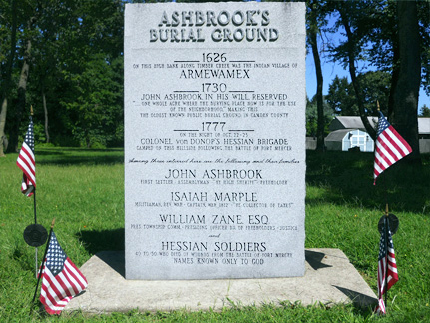
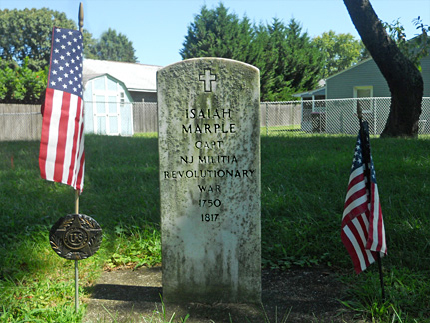
Ashbrook's Burial Ground
Station Ave. and Melvin Ave.
Map / Directions to the Ashbrook Burial Ground
The Ashbrook Burial Ground is Camden County's oldest known public burial ground. It takes its name from John Ashbrook, who is believed to be the area's first settler. The stone shown above left states that In 1730, John Ashbrook willed "one whole acre where the burying place now is for the use of the neighborhood."
After the Battle of Red Bank, on October 22, 1777, Colonel von Donop's Hessian Brigade stopped in this area briefly, after retreating over the nearby Clement's Road Bridge. They then continued their retreat to Haddonfield. Approximately 40 to 50 Hessian soldiers who died from wounds suffered at the Battle are buried here in unmarked graves.
There is also one American Revolutionary War soldier buried here, Captain Isaiah Marple (1750 - 1817), of the New Jersey Militia. He also later served in the War of 1812. [1]

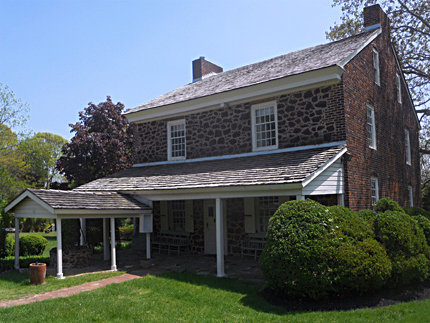
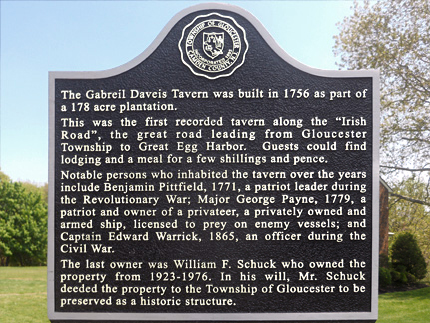
Gabreil Daveis Tavern
3rd Ave. and Floodgate Rd.
Map / Directions to the Gabreil Daveis Tavern
Map / Directions to all Gloucester Township Revolutionary War Sites
For information about upcoming open houses, see the
Gloucester Township Historic & Scenic Preservation Committee
Facebook page

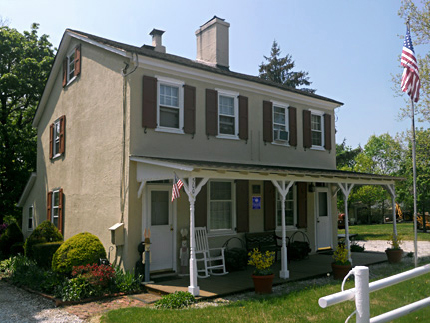
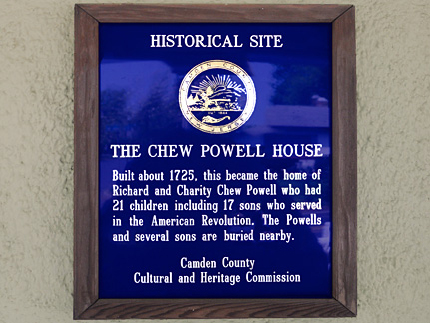
Chew-Powell House
Good Intent Rd.
Map / Directions to the Chew Powell House
Map / Directions to all Gloucester Township Revolutionary War Sites
This house is a private residence.
Please respect the privacy and property of the owners.
This house was built circa 1725, and so was already a half century old at the beginning of the Revolutionary War. It was the home of Richard Powell and his wife Charity Chew Powell. The couple had twenty-one children, twenty of whom were sons. Of these, seventeen served in the Revolutionary War:
Aaron
Abraham
Arthur
David
Ephraim
Isaac
Isaiah
Jacob
Jeremiah
John
Joseph
Philip
Richard, Jr.
Samuel
Thomas
William
A cemetery is located on the property, which contains the graves of Richard, Charity, and some of their sons. The cemetery is part of the private property and is not open to the public. [2]

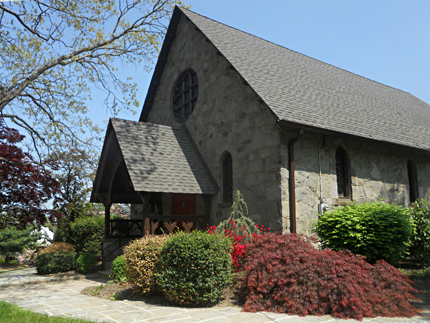
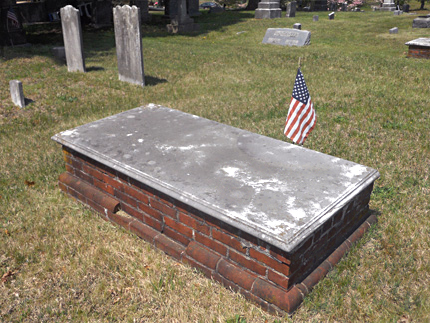
St. John the Evangelist Church and Cemetery
1720 Old Black Horse Pike
Map / Directions to St. John the Evangelist Church and Cemetery
Map / Directions to all Gloucester Township Revolutionary War Sites
The Church
The cemetery of St. John the Evangelist Church contains the grave of Aaron Chew (Dec. 19, 1751 - Sep. 3, 1805). Chew served as a second lieutenant in the Gloucester County Militia during the Revolutionary War. He was captured by the British in 1780, held as a prisoner of war, and later freed in a prisoner exchange.[3]
As described below, Aaron played an important role in the founding of this church, which also involved other Revolutionary War notables.
The Church [4]
The church building which stands here today was built in 1880-1881. It stands on the same land as an earlier church building, built in 1789-1790. When funds were needed to complete the church, Aaron Chew worked to raise the money. As part of his fundraising, he traveled to Philadelphia, which was then serving as the national capital, to raise money.
While in Philadelphia, Aaron received donations from notable Revolutionary War figures, including George Washington, who was then serving as the nation's first President, and James Madison, who was then serving in the House of Representatives. Among the other donors were:
Three signers of the Declaration of Independence: Abraham Clark, who signed for New Jersey, George Reed who signed for Delaware, and Charles Carroll who signed for Maryland.
Jonathan Dayton and William Paterson, who both signed the United States Constitution for New Jersey
Philemon Dickinson, who commanded the New Jersey militia during the Revolutionary War.
Frederick Muhlenberg, the first Speaker of the House in the United States Congress.

1. ^ Information about the Ashbrook Burial Ground, its history, and those buried here, is drawn from the stone marker at the front corner of the field.
The birth and death year information for Isaiah Marple does not appear on the marker, but it is on his gravestone.2. ^ Regarding the date of the house:
~The Camden County Cultural and Heritage Commission sign on the house states that it was built "about 1725."
~The National Register of Historic Place / Inventory - Nomination Form for the Chew-Powell house states "built ca. 1700-1725."
Available as a PDF at the National Park Service website here• For more information about the Powell familly, and the seventeen sons who served in the Revolutionary War, see:
~Janie Blankenship, "America's First Family / Powells Offer 17 Sons to Revolution" VFW Magazine, September 2012, pages 16-18, 28
~ The National Register of Historic Place / Inventory - Nomination Form for the Chew-Powell house states "built ca. 1700-1725."
Available as a PDF at the National Park Service website here▸▸I would like to thank Fred Feucht, the current owner of the house, for taking time to speak with me and provide me with copies of articles. Fred's parents, Joseph and Gertrude, bought the Chew-Powell house in 1970 and spent years restoring it.
3. ^ Regarding Joseph Chew's Revolutionary War record:
• William S. Stryker, Official Register of the Officers and Men of New Jersey in the Revolutionary War (Trenton: Wm. T. Nicholson & Co., 1872) pages 442
States, "Chew, Aaron. Second Lieutenant, Second Battalion, Gloucester; prisoner of war in September, 1780; exchanged.
Available to be read at Google Books here• Joseph Chew is listed in the Daughters of the American Revolution Genealogical Research System, where he is Ancestor #A021471
• The following documents mention Aaron Chew in regards to exchanging prisoners:
~ To George Washington from Arthur St. Clair, 26 March 1780,” Founders Online, National Archives (http://founders.archives.gov/documents/Washington/99-01-02-01239 [last update: 2015-09-29]).
~ “To George Washington from Abraham Skinner, 5 January 1781,” Founders Online, National Archives (http://founders.archives.gov/documents/Washington/99-01-02-04445 [last update: 2015-09-29])
▸Aaron's Chew's birth and death date information drawn from his gravestone, which states that he "departed this life the 23d day of September 1803 / Aged 53 years 9 months and 4 days."
4. ^ Information about the history of the church and it's donors was drawn from:
• Information provided to me in May and June 2015 by Shirley Mullen, the Parish Secretary at the Church of St. John the Evangelist. I would like to thank Shirley for taking the time to speak with me and mail me a list of the donors.
• National Register of Historic Places / Inventory - Nomination Form for St. John's
Available as a PDF at the National Park Service website here• History of St. John's Church article on the church's website